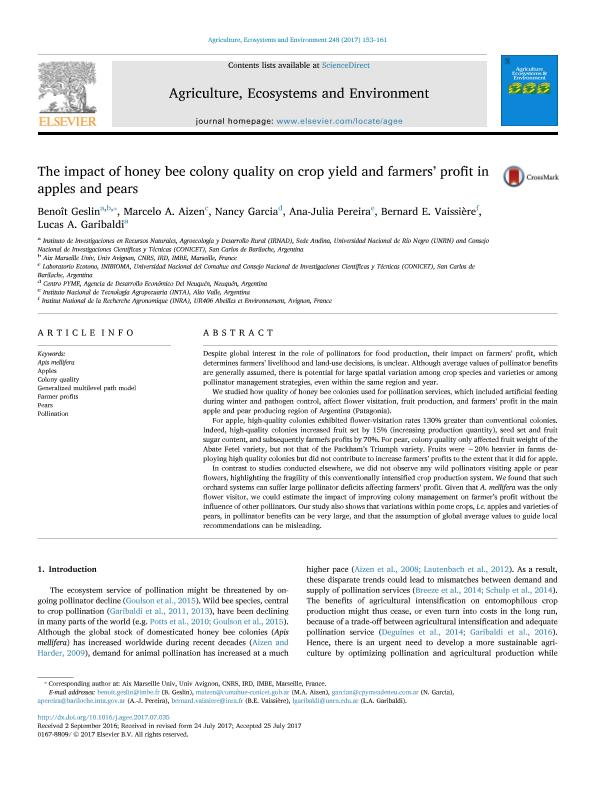Artículo
The impact of honey bee colony quality on crop yield and farmers’ profit in apples and pears
Benoit Geslin, Mathias Yanin ; Aizen, Marcelo Adrian
; Aizen, Marcelo Adrian ; Garcia, Nancy; Pereira, Ana Julia
; Garcia, Nancy; Pereira, Ana Julia ; Vaissière, Bernard E.; Garibaldi, Lucas Alejandro
; Vaissière, Bernard E.; Garibaldi, Lucas Alejandro
 ; Aizen, Marcelo Adrian
; Aizen, Marcelo Adrian ; Garcia, Nancy; Pereira, Ana Julia
; Garcia, Nancy; Pereira, Ana Julia ; Vaissière, Bernard E.; Garibaldi, Lucas Alejandro
; Vaissière, Bernard E.; Garibaldi, Lucas Alejandro
Fecha de publicación:
08/2017
Editorial:
Elsevier Science
Revista:
Agriculture, Ecosystems and Environment
ISSN:
0167-8809
Idioma:
Inglés
Tipo de recurso:
Artículo publicado
Clasificación temática:
Resumen
Despite global interest in the role of pollinators for food production, their impact on farmers’ profit, which determines farmers’ livelihood and land-use decisions, is unclear. Although average values of pollinator benefits are generally assumed, there is potential for large spatial variation among crop species and varieties or among pollinator management strategies, even within the same region and year. We studied how quality of honey bee colonies used for pollination services, which included artificial feeding during winter and pathogen control, affect flower visitation, fruit production, and farmers’ profit in the main apple and pear producing region of Argentina (Patagonia). For apple, high-quality colonies exhibited flower-visitation rates 130% greater than conventional colonies. Indeed, high-quality colonies increased fruit set by 15% (increasing production quantity), seed set and fruit sugar content, and subsequently farmeŕs profits by 70%. For pear, colony quality only affected fruit weight of the Abate Fetel variety, but not that of the Packham’s Triumph variety. Fruits were ∼20% heavier in farms deploying high quality colonies but did not contribute to increase farmers’ profits to the extent that it did for apple. In contrast to studies conducted elsewhere, we did not observe any wild pollinators visiting apple or pear flowers, highlighting the fragility of this conventionally intensified crop production system. We found that such orchard systems can suffer large pollinator deficits affecting farmers’ profit. Given that A. mellifera was the only flower visitor, we could estimate the impact of improving colony management on farmer’s profit without the influence of other pollinators. Our study also shows that variations within pome crops, i.e. apples and varieties of pears, in pollinator benefits can be very large, and that the assumption of global average values to guide local recommendations can be misleading.
Archivos asociados
Licencia
Identificadores
Colecciones
Articulos(CCT - PATAGONIA NORTE)
Articulos de CTRO.CIENTIFICO TECNOL.CONICET - PATAGONIA NORTE
Articulos de CTRO.CIENTIFICO TECNOL.CONICET - PATAGONIA NORTE
Citación
Aizen, Marcelo Adrian; Garibaldi, Lucas Alejandro; Vaissière, Bernard E.; Pereira, Ana Julia; Garcia, Nancy; Benoit Geslin, Mathias Yanin; et al.; The impact of honey bee colony quality on crop yield and farmers’ profit in apples and pears; Elsevier Science; Agriculture, Ecosystems and Environment; 248; 8-2017; 153-161
Compartir
Altmétricas



